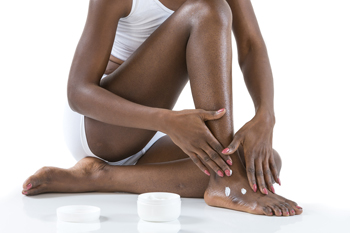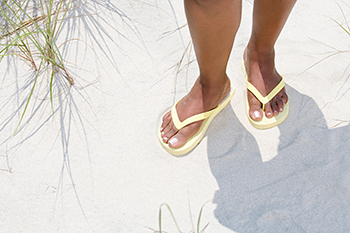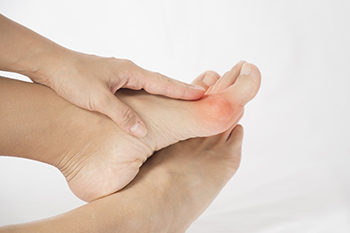
Our feet are important in our everyday lives. The problem is that we tend to neglect them. When this becomes a habit, it can cause significant trouble. Ignoring foot problems can mean pain, limited mobility, and expensive doctor's visits. On the other hand, if feet are cared for and looked after regularly, they will perform without pain or complication.
Routine hygiene is the most basic way to care for the feet. Wash and dry them thoroughly daily. Remember to get between the toes and keep the toenails trimmed and short. If the feet feel dry or there are signs of dryness or cracking, use a moisturizer designed for the feet.
When using moisturizer on the feet, try to avoid applying between the toes. If cream or lotion sits too long, they can cause fungal and bacterial growth. When moisturizer is used between the toes, it can also cause the skin to soften too much.
Shoes are also an important aspect of foot care. When one is picking out shoes, make sure they are the correct size. Shoes need to be snug, but not too tight. On the other hand, if shoes are too loose they can cause foot problems as well. It is highly recommended that shopping for new shoes be done later in the day. The reason for this is that the feet will have settled and swelled to their full size by then. To keep your feet at their most healthy, avoid wearing high heels or flip flops too often. Instead, choose shoes that are good for your feet. Good shoes pad the soles of your feet and support the arches and ankles.
Socks should also be worn daily with closed-toe shoes. They may feel hot during the summer months, but they absorb sweat and moisture off the feet. Without socks, the build-up of sweat in a closed-toe shoe can cause fungal problems and athlete's foot.
The best thing to remember in every day foot care is that shoes do make a difference. If you spend a lot of time on your feet, make sure that your shoes show no signs of wear. Shoes should offer ample support for the arches and the overall foot. Additionally, try to make foot cleaning and maintenance a daily habit. If you keep these things in mind, your feet will stay healthy and safe.
 While the feet can often be ignored in self care, taking care of your feet is a big part of being healthy and avoiding problems down the road. Proper foot care can help prevent fungal infections, cracked heels, corns, calluses, bunions, ingrown toenails and much more from developing. Since bacteria and fungi thrive in damp areas, it is important to wash and dry your feet thoroughly—especially between the toes. Moisturize your heels to prevent them from becoming dry, chapped, or cracked. Pamper your feet occasionally by soaking them to keep them soft and supple. Trim toenails straight across but not so short that ingrown toenails can occur. Wear moisture-wicking socks to keep the feet dry, and comfortable shoes that support your heels and arches as well as fit properly. It is also suggested that you have your feet checked by a podiatrist to help you maintain the best overall foot health.
While the feet can often be ignored in self care, taking care of your feet is a big part of being healthy and avoiding problems down the road. Proper foot care can help prevent fungal infections, cracked heels, corns, calluses, bunions, ingrown toenails and much more from developing. Since bacteria and fungi thrive in damp areas, it is important to wash and dry your feet thoroughly—especially between the toes. Moisturize your heels to prevent them from becoming dry, chapped, or cracked. Pamper your feet occasionally by soaking them to keep them soft and supple. Trim toenails straight across but not so short that ingrown toenails can occur. Wear moisture-wicking socks to keep the feet dry, and comfortable shoes that support your heels and arches as well as fit properly. It is also suggested that you have your feet checked by a podiatrist to help you maintain the best overall foot health.
Everyday foot care is very important to prevent infection and other foot ailments. If you need your feet checked, contact Dr. Robert Hope from Riverside Podiatry. Our doctor can provide the care you need to keep you pain-free and on your feet.
Everyday Foot Care
Often, people take care of their bodies, face and hair more so than they do for their feet. But the feet are a very important aspect of our bodies, and one that we should pay more attention to. Without our feet, we would not be able to perform most daily tasks.
It is best to check your feet regularly to make sure there are no new bruises or cuts that you may not have noticed before. For dry feet, moisturizer can easily be a remedy and can be applied as often as necessary to the affected areas. Wearing shoes that fit well can also help you maintain good foot health, as well as making it easier to walk and do daily activities without the stress or pain of ill-fitting shoes, high heels, or even flip flops. Wearing clean socks with closed shoes is important to ensure that sweat and bacteria do not accumulate within the shoe. Clean socks help to prevent Athlete’s foot, fungi problems, bad odors, and can absorb sweat.
If you have any questions please feel free to contact our office located in Tuscaloosa, and Fayette, AL . We offer the newest diagnostic and treatment technologies for all your foot and ankle needs.
Although it may be tempting to wear flip-flops in warm weather, they are not the best choice of footwear for your feet. Flip-flops may be ideal for the beach, pool, spa, and shared showers, but you should avoid wearing them unless it is completely necessary.
Flip-flops only have a small strip of fabric holding your foot in place, but your toes need a better grip to keep your foot in place. The repetitive gripping can lead to an overuse of your muscles, which could result in tendinitis. This is only one of the many problems that stem from wearing flip-flops too often.
Flip flops aren’t good for extensive walking because they fail to offer arch support, heel cushioning, or shock absorption. As a result, people who wear flip flops are at a higher risk of experiencing an sprain. Additionally, these shoes offer little protection for your feet, putting those who wear them at a greater risk for stubbed toes, glass cuts, and puncture wounds.
Although flip flops aren’t recommended for everyday use by anyone, it is especially important for diabetics to avoid them. A diabetic foot injury can easily become very serious, and it may even lead to amputation.
If you are experiencing pain from wearing flip-flops, you shouldn’t be hesitant to replace them with a more comfortable shoe that offers more support. If your flip-flop foot pain doesn’t go away, you should seek assistance from a podiatrist right away. It is possible that you may have a more serious foot problem such as a stress fracture or arthritis.
 There are so many different styles of shoes that are available for purchase, but flip flops are often the quick go to and one of the most dangerous to frequently wear. Various foot conditions may develop as a result of wearing flip flops and most can cause severe pain and discomfort. Some of these ailments can include blisters, corns, arch pain, Achilles tendonitis, and most commonly plantar fasciitis or heel pain. It is a natural reaction for the toes to grip the front of the shoe in an effort to have them stay on the feet. This can lead to aching and soreness throughout the entire foot. If flip flops are still your top choice to wear it can be beneficial to rotate them with other styles of flip flops. Sandals that have a strap around the heel can also be less harmful to the feet and it may help to wear high-quality flips flops that are constructed of leather materials. Additionally, it is suggested to refrain from wearing socks with flip flops as this can cause foot strain too. If you have questions about how to choose the right flip flops for you, please consult with a podiatrist.
There are so many different styles of shoes that are available for purchase, but flip flops are often the quick go to and one of the most dangerous to frequently wear. Various foot conditions may develop as a result of wearing flip flops and most can cause severe pain and discomfort. Some of these ailments can include blisters, corns, arch pain, Achilles tendonitis, and most commonly plantar fasciitis or heel pain. It is a natural reaction for the toes to grip the front of the shoe in an effort to have them stay on the feet. This can lead to aching and soreness throughout the entire foot. If flip flops are still your top choice to wear it can be beneficial to rotate them with other styles of flip flops. Sandals that have a strap around the heel can also be less harmful to the feet and it may help to wear high-quality flips flops that are constructed of leather materials. Additionally, it is suggested to refrain from wearing socks with flip flops as this can cause foot strain too. If you have questions about how to choose the right flip flops for you, please consult with a podiatrist.
Flip-flops can cause a lot of problems for your feet. If you have any concerns about your feet or s, contact Dr. Robert Hope from Riverside Podiatry. Our doctor will assist you with all of your foot needs.
Flip-Flops and Feet
Flip-flops have managed to become a summer essential for a lot of people. While the shoes may be stylish and easy to slip on and off, they can be dangerous to those who wear them too often. These shoes might protect you from fungal infections such as athlete’s foot, but they can also give you foot pain and sprained s if you trip while wearing them.
When Are They Okay to Wear?
Flip-flops should only be worn for very short periods of time. They can help protect your feet in places that are crawling with fungi, such as gym locker rooms. Athlete’s foot and plantar warts are two common fungi that flip-flops may help protect your feet against.
Why Are They Bad for My Feet?
These shoes do not offer any arch support, so they are not ideal for everyday use. They also do not provide shock absorption or heel cushioning which can be problematic for your feet. Additionally, you may suffer from glass cuts, puncture wounds, and stubbed toes since they offer little protection for your feet.
More Reasons Why They Are Bad for Your Feet
If you have any questions, please feel free to contact our office located in Tuscaloosa, and Fayette, AL . We offer the newest diagnostic and treatment technologies for all your foot care needs.
Read more about Flipping Out About Flip FlopsA bunion is an enlargement of the base joint of the toe that connects to the foot, often formed from a bony growth or a patch of swollen tissues. It is caused by the inward shifting of the bones in the big toe, toward the other toes of the foot. This shift can cause a serious amount of pain and discomfort. The area around the big toe can become inflamed, red, and painful.
Bunions are most commonly formed in people who are already genetically predisposed to them or other kinds of bone displacements. Existing bunions can be worsened by wearing improperly fitting shoes. Trying to cram your feet into high heels or running or walking in a way that causes too much stress on the feet can exacerbate bunion development. High heels not only push the big toe inward, but shift one's body weight and center of gravity towards the edge of the feet and toes, expediting bone displacement.
A podiatrist knowledgeable in foot structure and biomechanics will be able to quickly diagnose bunions. Bunions must be distinguished from gout or arthritic conditions, so blood tests may be necessary. The podiatrist may order a radiological exam to provide an image of the bone structure. If the x-ray demonstrates an enlargement of the joint near the base of the toe and a shifting toward the smaller toes, this is indicative of a bunion.
Wearing wider shoes can reduce pressure on the bunion and minimize pain, and high heeled shoes should be eliminated for a period of time. This may be enough to eliminate the pain associated with bunions; however, if pain persists, anti-inflammatory drugs may be prescribed. Severe pain may require an injection of steroids near the bunion. Orthotics for shoes may be prescribed which, by altering the pressure on the foot, can be helpful in reducing pain. These do not correct the problem; but by eliminating the pain, they can provide relief.
For cases that do not respond to these methods of treatment, surgery can be done to reposition the toe. A surgeon may do this by taking out a section of bone or by rearranging the ligaments and tendons in the toe to help keep it properly aligned. It may be necessary even after surgery to wear more comfortable shoes that avoid placing pressure on the toe, as the big toe may move back to its former orientation toward the smaller toes.
 Bunions are bony growths that appear on the outer side of the foot at the base of the big toe joint. This is a deformity that may cause pain, swelling, redness, and difficulty wearing shoes and while walking. When left untreated, bunions tend to progressively worsen over time. As a bunion grows, it pushes the big toe towards the smaller toes, changing the shape of the foot in the process. The misaligned big toe may then push the second toe out of alignment. Bunions can also lead to arthritis in the big toe joints. Bunions can be managed and their progression can be slowed through a variety of conservative treatments, such as footwear modifications. Surgery may also be an option and can permanently correct a bunion. If you suffer from bunions, it is suggested that you see a podiatrist for treatment.
Bunions are bony growths that appear on the outer side of the foot at the base of the big toe joint. This is a deformity that may cause pain, swelling, redness, and difficulty wearing shoes and while walking. When left untreated, bunions tend to progressively worsen over time. As a bunion grows, it pushes the big toe towards the smaller toes, changing the shape of the foot in the process. The misaligned big toe may then push the second toe out of alignment. Bunions can also lead to arthritis in the big toe joints. Bunions can be managed and their progression can be slowed through a variety of conservative treatments, such as footwear modifications. Surgery may also be an option and can permanently correct a bunion. If you suffer from bunions, it is suggested that you see a podiatrist for treatment.
If you are suffering from bunion pain, contact Dr. Robert Hope of Riverside Podiatry. Our doctor can provide the care you need to keep you pain-free and on your feet.
What Is a Bunion?
Bunions are painful bony bumps that usually develop on the inside of the foot at the joint of the big toe. As the deformity increases over time, it may become painful to walk and wear shoes. Women are more likely to exacerbate existing bunions since they often wear tight, narrow shoes that shift their toes together. Bunion pain can be relieved by wearing wider shoes with enough room for the toes.
Causes
Symptoms
In order to diagnose your bunion, your podiatrist may ask about your medical history, symptoms, and general health. Your doctor might also order an x-ray to take a closer look at your feet. Nonsurgical treatment options include orthotics, padding, icing, changes in footwear, and medication. If nonsurgical treatments don’t alleviate your bunion pain, surgery may be necessary.
If you have any questions, please feel free to contact our office located in Tuscaloosa, and Fayette, AL . We offer the newest diagnostic and treatment technologies for all your foot care needs.